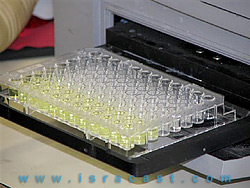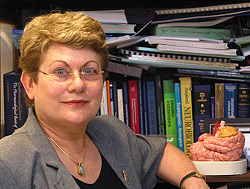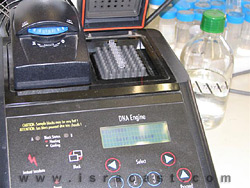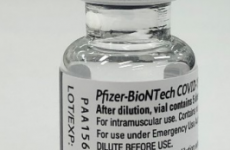
A new technique that can accurately diagnose anxiety disorders by performing a simple blood test, was developed at the Hebrew University in Jerusalem. The researchers hope that the anxiety blood test will soon make its way into hospitals and E.R. rooms and give doctors and psychiatrists a quick and precise tool for examining, and eventually treating, these disorders. The team has recently started work on another common illness – depression. They hope to find a way to diagnose and finally treat the millions who suffer from this illness as well.

For centuries people suffering from one form or another of anxiety disorder were either ignored or treated as mad by the medical establishment. Modern medicine helped by developing drugs that can treat various forms of anxiety disorders fairly well. The problem was that until now the only way to diagnose anxiety disorders was through an examination by a trained psychiatrist. Many people who are reluctant to undergo this examination are left untreated and can continue to suffer for many years. Research conducted by a team of scientists from the Hebrew University hopes to change all that. Professor Hermona Soreq, Dean of the Faculty of Science, who led the Hebrew University team, took it upon herself to find the biological basis of anxiety. Several years ago an opportunity presented itself when Professor Soreq received an invitation to join a consortium which created a large database on anxiety disorders in the U.S.
The initial research conducted was based on test results obtained from 461 individuals from the U.S. (198 men and 263 women) and was taken from two-generation families of African-American or Caucasian origin. These subjects underwent extensive blood tests as well as standard psychological tests to determine whether they suffered from anxiety.

Understanding Soreq’s work requires some background into the way anxiety disorders occur in the human body. Acetylcholine (ACh) is a neurotransmitter of the central nervous system. ACh was actually the first neurotransmitter to be identified in 1914 and it plays an important role in the control of muscles, sweating sensation and other activities inside the central nervous system. Over the years studies have shown that when the body feels stress (for example when a child jumps in front of your car) the level of ACh in the synapses rises. In order for the body to return to normal levels of ACh a special enzyme called Acetylcholinesterase (AChE) which breaks down the ACh, springs into action. Normally the levels of ACh and AchE decrease after the cause of the stress disappears, but people suffering from anxiety disorders continue to maintain high levels of ACh and AChE. As is the case with many other complex interactions inside the body, there are more than just two factors responsible for each behavioral pattern. Previous studies on mice suggested that two other enzymes called butyrylcholinesterase (BChE) and paraoxonase (PON) are also involved in the anxiety controlling mechanism.
Since it is currently too complex to measure ACh directly, Professor Soreq and her team aimed at testing if people with abnormal levels of AChE, BChE and PON would also show anxiety symptoms and comparing this data to the psychological tests conducted separately. The results surprised even Soreq herself as she admitted in an interview to IsraCast . Her team found more than a 90% correlation between people who were diagnosed with higher than usual anxiety by a psychologist and people with abnormal AChE, BChE and PON levels. This result did not come easily to Soreq’s team: first, they had to conduct numerous DNA tests on the blood samples they received in order to find the specific genes responsible for the increased risk of anxiety. These tests helped identify four main groups of people with an elevated tendency for developing anxiety disorders: women, African-American, people with low Body Mass Index (BMI) and people who have suffered a previous trauma in their lives. In order to devise an effective blood test for anxiety, the team had to take a number of factors into consideration. Since normal levels of AChE decrease with age, Soreq’s team had to create an index that calculated the optimum AChE, BChE and PON levels in comparison to age, BMI and a few other relevant factors.

The most immediate consequence of the work conducted by Soreq’s team was the development of a standard blood test for anxiety equipped with a set of equations into which the results will be introduced. According to Soreq the blood test will be inexpensive, accurate and will take only a few hours to receive the results. Currently the blood test is not yet available, as Yissum, the Hebrew University technology transfer company, in charge of the commercialization of the research is looking for a partner from the medical industry to help push the research out of the laboratory and into hospitals and clinics. If all goes according to plan said Soreq, the blood test can be available on the market in less than a year.
Another consequence of Soreq’s research is work currently being done in a start-up company called Ester Neuroscience which was created by the venture capital fund Medica in 1997. The company is currently in second-phase trials of a drug for a neuromuscular transmission disorder called Myasthenia Gravis. The disorder which is fairly rare (approximately 36,000 cases in the United States) is diagnosed as specific muscle weakness. In patients of Myasthenia Gravis, ACh is released normally, but its effect on the nerve is diminished causing reduced muscle action. The drug developed by Ester Neuroscience is a synthetic DNA which is consumed orally, and current work is on the way to develop variants for the drug for the treatment of Alzheimer’s disease, amyotrophic lateral sclerosis and acute stress reactions.




